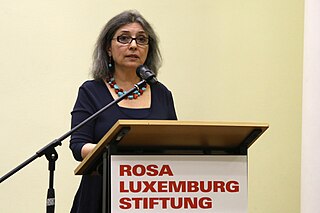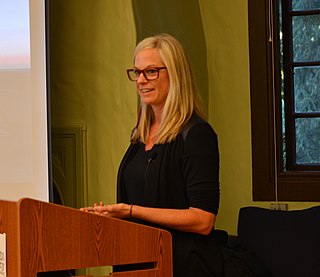Career
Kaplan is a proponent of the digital humanities and has turned the critical lens of cultural studies upon topics such as travel,visual culture,militarization and the construction of consumer subjects. Her book Questions of Travel is about the development of a social science attentive to the role of travel and mobility in everyday life and contemporary culture. [3] Along with figures such as Lisa Parks,Kaplan has expanded feminist studies of technology and infrastructure through her work on aerial imagery and mapping,the Global Positioning System (GPS),and the rise of drones and remote sensing technologies in warfare and policing. [4]
Kaplan graduated from Hampshire College in 1977 with a degree in social theory and received her Ph.D. in 1987 from the History of Consciousness program at the University of California at Santa Cruz. She wrote her dissertation,The Poetics of Displacement:Exile,Immigration,and Travel in Contemporary Autobiographical Writing,under the direction of James Clifford,Donna Haraway,and Teresa de Lauretis. [5] Before accepting her position at UC Davis,Kaplan held teaching appointments at the University of California Berkeley and Georgetown University. In 2006–2007,she won the Digital Innovation Fellowship from the American Council of Learned Societies. [6] Kaplan was the founder of the Designated Emphasis on Women,Gender and Sexuality [7] at UC Berkeley when she was a professor there and influenced scholars such as Mimi Thi Nguyen,Vernadette Vicuna Gonzalez,and Jasbir Puar. At UC Davis,Kaplan founded the interdisciplinary Critical Militarization,Policing,and Security Studies (CRTMIL),a working group for the study of emergent and everyday practices and technologies of state power. [8] There she influenced scholars such as Toby Beauchamp,Liz Montegary,Abigail Boggs,Tristan Josephson,and Andrea Miller.
Women's studies is an academic field that draws on feminist and interdisciplinary methods to place women's lives and experiences at the center of study, while examining social and cultural constructs of gender; systems of privilege and oppression; and the relationships between power and gender as they intersect with other identities and social locations such as race, sexual orientation, socio-economic class, and disability.
Postmodern feminism is a mix of postmodernism and French feminism that rejects a universal female subject. The goal of postmodern feminism is to destabilize the patriarchal norms entrenched in society that have led to gender inequality. Postmodern feminists seek to accomplish this goal through opposing essentialism, philosophy, and universal truths in favor of embracing the differences that exist amongst women in order to demonstrate that not all women are the same. These ideologies are rejected by postmodern feminists because they believe if a universal truth is applied to all women of society, it minimizes individual experience, hence they warn women to be aware of ideas displayed as the norm in society since it may stem from masculine notions of how women should be portrayed.

Feminist sociology is an interdisciplinary exploration of gender and power throughout society. Here, it uses conflict theory and theoretical perspectives to observe gender in its relation to power, both at the level of face-to-face interaction and reflexivity within social structures at large. Focuses include sexual orientation, race, economic status, and nationality.
Transnational feminism refers to both a contemporary feminist paradigm and the corresponding activist movement. Both the theories and activist practices are concerned with how globalization and capitalism affect people across nations, races, genders, classes, and sexualities. This movement asks to critique the ideologies of traditional white, classist, western models of feminist practices from an intersectional approach and how these connect with labor, theoretical applications, and analytical practice on a geopolitical scale.

Cynthia Holden Enloe is an American political theorist, feminist writer, and professor. She is best known for her work on gender and militarism and for her contributions to the field of feminist international relations. She has also influenced the field of feminist political geography, with feminist geopolitics in particular.

Shahrzad Mojab is an academic activist and professor, teaching at the Department of Leadership, Higher and Adult Education and Women and Gender Studies Institute, at the University of Toronto. Shahrzad has been living in Canada since 1986 with her lifelong partner, colleague and comrade, Amir Hassanpour, and their son, Salah.
Amrit Basu is an American academic and political scientist. She currently is a professor at Amherst College where she holds affiliations in the departments of Political Science, Sexuality, Women's, & Gender Studies, Asian Languages & Civilizations, and Black Studies. He is currently a Senior Vice President at Capital Dynamics, a private equity firm in NYC.

A variety of movements of feminist ideology have developed over the years. They vary in goals, strategies, and affiliations. They often overlap, and some feminists identify themselves with several branches of feminist thought.
Inderpal Grewal is a professor of Women's, Gender and Sexuality Studies at Yale University, and a key figure in the academic discipline of women's studies. She is an influential feminist scholar whose research interests include transnational and postcolonial feminist theory; feminism and human rights; nongovernmental organizations and theories of civil society and citizenship; law and subjectivity; travel and mobility and South Asian cultural studies. Together with Caren Kaplan, Grewal is best known for her work as a founder of the field of transnational feminist cultural studies or transnational feminism. She has served on the Editorial and Advisory Boards of core journals in the field of feminist cultural studies, Women's Studies Quarterly; Jouvert: Journal of Postcolonial Studies and Meridians: feminisms, race, transnationalism. She is also one of three series editors for the New Wave in Women's Studies book series published by Duke University Press., and blogs about gender issues for the Huffington Post.
Feminist technoscience is a transdisciplinary branch of science studies which emerged from decades of feminist critique on the way gender and other identity markers are entangled in the combined fields of science and technology. The term technoscience, especially in regard to the field of feminist technoscience studies, seeks to remove the distinction between scientific research and development with applied applications of technology while assuming science is entwined with the common interests of society. As a result, science is suggested to be held to the same level of political and ethical accountability as the technologies which develop from it. Feminist technoscience studies continue to develop new theories on how politics of gender and other identity markers are interconnected to resulting processes of technical change, and power relations of the globalized, material world.
Minoo Moallem is an Iranian-born American educator, author, and scholar. She is a Professor of Gender and Women’s Studies at the University of California at Berkeley. Her academic specialties are transnational and postcolonial feminist studies, religious nationalism and transnationalism, consumer culture, immigration and diaspora studies, Middle Eastern Studies and Iranian films, cultural politics. She is best known for her work on Islamic nationalism and fundamentalism as byproducts of colonial modernity and modernization of patriarchies.
Chela Sandoval, associate professor of Chicana Studies at University of California, Santa Barbara, is a noted theorist of postcolonial feminism and third world feminism. Beginning with her 1991 pioneering essay 'U.S. Third World Feminism: The Theory and Method of Oppositional Consciousness in the Postmodern World', Sandoval emerged as a significant voice for women of color and decolonial feminism.
Lisa E. Bloom is an American cultural critic, educator and feminist art historian specializing in polar studies, contemporary art, environmental art, history of photography, visual culture and film studies and is known for her books and essay contributions to these areas.

Chandra Talpade Mohanty is a Distinguished Professor of Women's and Gender Studies, Sociology, and the Cultural Foundations of Education and Dean's Professor of the Humanities at Syracuse University. Mohanty, a postcolonial and transnational feminist theorist, has argued for the inclusion of a transnational approach in exploring women’s experiences across the world. She is author of Feminism Without Borders: Decolonizing Theory, Practicing Solidarity, and co-editor of Third World Women and the Politics of Feminism, Feminist Genealogies, Colonial Legacies, Democratic Futures, Feminism and War: Confronting U.S. Imperialism,, The Sage Handbook on Identities, and Feminist Freedom Warriors: Genealogies, Justice, Politics, and Hope.
The Feminist Studies Department at the University of California, Santa Cruz constitutes one of the oldest departments of gender and sexuality studies in the world. It was founded as a women's studies department in 1974. It is considered among the most influential departments in feminist studies, post-structuralism, and feminist political theory. In addition to its age and reputation, the department is significant for its numerous notable faculty, graduates, and students.

Feminist rhetoric emphasizes the narratives of all demographics, including women and other marginalized groups, into the consideration or practice of rhetoric. Feminist rhetoric does not focus exclusively on the rhetoric of women or feminists but instead prioritizes the feminist principles of inclusivity, community, and equality over the classic, patriarchal model of persuasion that ultimately separates people from their own experience. Seen as the act of producing or the study of feminist discourses, feminist rhetoric emphasizes and supports the lived experiences and histories of all human beings in all manner of experiences. It also redefines traditional delivery sites to include non-traditional locations such as demonstrations, letter writing, and digital processes, and alternative practices such as rhetorical listening and productive silence. In her book, Rhetorical Feminism and This Thing Called Hope (2018), Cheryl Glenn describes rhetorical feminism as, "a set of tactics that multiplies rhetorical opportunities in terms of who counts as a rhetor, who can inhabit an audience, and what those audiences can do." Rhetorical feminism is a strategy that counters traditional forms of rhetoric, favoring dialogue over monologue and seeking to redefine the way audiences view rhetorical appeals.

Emma Pérez is an American author and professor, known for her work in queer Chicana feminist studies.

Lisa Ann Parks is Distinguished Professor of Film and Media Studies and Director of the Global Media Technologies & Cultures (GMTaC) Lab at the University of California at Santa Barbara. She was formerly Professor of Comparative Media Studies and Science, Technology and Society at the Massachusetts Institute of Technology, where she founded the GMTaC Lab. She won a MacArthur "Genius" Fellowship in 2018 for "exploring the global reach of information technology infrastructures".
Scholarship on nationalism and gender explores the processes by which gender affects and is impacted by the development of nationalism. Sometimes referred to as "gendered nationalism," gender and nationalism describes the phenomena whereby conceptions of the state or nation, including notions of citizenship, sovereignty, or national identity contribute to or arise in relation to gender roles.

Carceral feminism is a critical term for types of feminism that advocate for enhancing and increasing prison sentences that deal with feminist and gender issues. The term criticises the belief that harsher and longer prison sentences will help work towards solving these issues. The phrase "carceral feminism" was coined by Elizabeth Bernstein, a feminist sociologist, in her 2007 article, "The Sexual Politics of the 'New Abolitionism'". Examining the contemporary anti-trafficking movement in the United States, Bernstein introduced the term to describe a type of feminist activism which casts all forms of sexual labor as sex trafficking. She sees this as a retrograde step, suggesting it erodes the rights of women in the sex industry, and takes the focus off other important feminist issues, and expands the neoliberal agenda.








